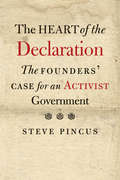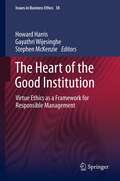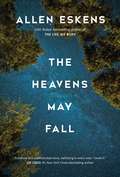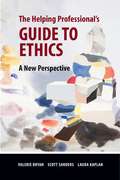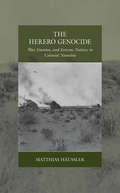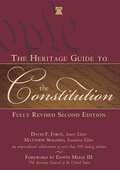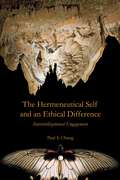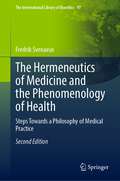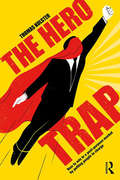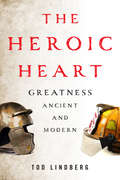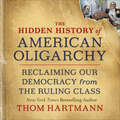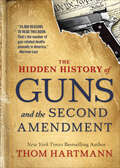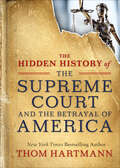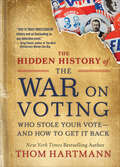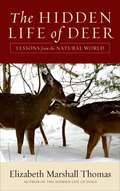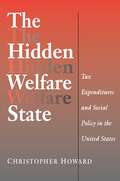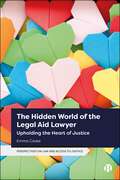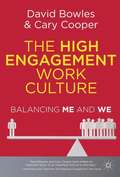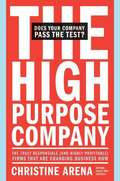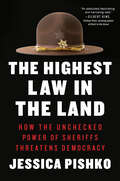- Table View
- List View
The Heart of the Declaration: The Founders' Case for an Activist Government
by Steve PincusAn eye-opening, meticulously researched new perspective on the influences that shaped the Founders as well as the nation's founding document From one election cycle to the next, a defining question continues to divide the country's political parties: Should the government play a major or a minor role in the lives of American citizens? The Declaration of Independence has long been invoked as a philosophical treatise in favor of limited government. Yet the bulk of the document is a discussion of policy, in which the Founders outlined the failures of the British imperial government. Above all, they declared, the British state since 1760 had done too little to promote the prosperity of its American subjects. Looking beyond the Declaration's frequently cited opening paragraphs, Steve Pincus reveals how the document is actually a blueprint for a government with extensive powers to promote and protect the people's welfare. By examining the Declaration in the context of British imperial debates, Pincus offers a nuanced portrait of the Founders' intentions with profound political implications for today.
The Heart of the Good Institution: Virtue Ethics as a Framework for Responsible Management
by Howard Harris Gayathri Wijesinghe Stephen MckenzieThis book addresses the question: how can institutions develop and maintain a good purpose? And how can managers contribute to this endeavour? Twelve contributions explore this question, using MacIntyrean inquiry as a basis for exploring four main themes: Can management be considered a practice in the MacIntyrean sense? What is the role of specific virtues in the development of a virtuous institution? What are management vices and what are the conditions in which they flourish? And, can we use MacIntyrean ideas to consider the management of all forms of institutions? The volume is an international and multidisciplinary collection, with contributions from well-known writers in the field of management ethics, and innovative contributions that use MacIntyrean inquiry as a lens to examine fields such as hospitality, user generated music content and social sustainability. The papers are unified by their concern for the achievement of organizational excellence and integrity through ethical management. Unlike single author texts this edited volume brings together multiple perspectives on the topic of virtue ethics in management. In doing so, it explores the topic both more deeply and more widely than a single author can do. Because of its breadth, this book has the potential to become a turn-to research tool for those interested in virtue theory's relevance to other academic interests such as organizational behavior (including motivation theory and social psychology), literature, contemporary social issue criticism, and business management.
The Heavens May Fall
by Allen EskensFEATURING THREE CHARACTERS FROM THE BESTSELLING BOOK-CLUB FAVORITE THE LIFE WE BURY, THIS NOVEL EXPLORES A RIVETING MURDER CASE TOLD FROM TWO OPPOSING PERSPECTIVES. Detective Max Rupert and attorney Boady Sanden's friendship is being pushed to the breaking point. Max is convinced that Jennavieve Pruitt was killed by her husband, Ben. Boady is equally convinced that Ben, his client, is innocent. As the case unfolds, the two are forced to confront their own personal demons. Max is still struggling with the death of his wife four years earlier, and the Pruitt case stirs up old memories. Boady hasn't taken on a defense case since the death of an innocent client, a man Boady believes he could have saved but didn't. Now he is back in court, with student Lila Nash at his side, and he's determined to redeem himself for having failed in the past. Vividly told from two opposing perspectives, the truth about the stunning death of Jennavieve Pruitt remains a mystery until the very end.From the Trade Paperback edition.
The Helping Professionals Guide to Ethics: A New Perspective
by Valerie Bryan; Scott Sanders; Laura KaplanThis book develops a comprehensive framework for ethics in the helping professions based on bioethicist Bernard Gert's theory of common morality. The prevailing model of ethics education is built upon adherence to codes of ethics applied largely through the use of decision-making trees. While a firm understanding of a professions code of ethics and all relevant laws is essential to responsible practice, this approach to teaching ethics excludes the opportunity for students to acquire a holistic, and grounded understanding of moral action. The framework proposed in this text moves beyond codes of ethics, and allows students to develop a cohesive sense of ethical reasoning that both validates their moral intuition and challenges moral assumptions. The theory of a common morality uses a systematic, step-by-step approach that readers and practitioners can apply to all questions of moral action and behavior. While there is no such thing as a single right answer to any ethical question, by following this approach practitioners can confidently eliminate the bad decisions, allowing them to feel more secure in their decision and practice.
The Herero Genocide: War, Emotion, and Extreme Violence in Colonial Namibia (War and Genocide #31)
by Matthias HäusslerDrawing on previously inaccessible and overlooked archival sources, The Herero Genocide undertakes a groundbreaking investigation into the war between colonizer and colonized in what was formerly German South-West Africa and is today the nation of Namibia. In addition to its eye-opening depictions of the starvation, disease, mass captivity, and other atrocities suffered by the Herero, it reaches surprising conclusions about the nature of imperial dominion, showing how the colonial state’s genocidal posture arose from its own inherent weakness and military failures. The result is an indispensable account of a genocide that has been neglected for too long.
The Herero Genocide: War, Emotion, and Extreme Violence in Colonial Namibia (War and Genocide #31)
by Matthias HäusslerDrawing on previously inaccessible and overlooked archival sources, The Herero Genocide undertakes a groundbreaking investigation into the war between colonizer and colonized in what was formerly German South-West Africa and is today the nation of Namibia. In addition to its eye-opening depictions of the starvation, disease, mass captivity, and other atrocities suffered by the Herero, it reaches surprising conclusions about the nature of imperial dominion, showing how the colonial state’s genocidal posture arose from its own inherent weakness and military failures. The result is an indispensable account of a genocide that has been neglected for too long.
The Heritage Guide to the Constitution: Fully Revised Second Edition
by Edwin Meese III Matthew Spalding David F. ForteA landmark work of more than one hundred scholars, The Heritage Guide to the Constitution is a unique line-by-line analysis explaining every clause of America's founding charter and its contemporary meaning.In this fully revised second edition, leading scholars in law, history, and public policy offer more than two hundred updated and incisive essays on every clause of the Constitution.From the stirring words of the Preamble to the Twenty-seventh Amendment, you will gain new insights into the ideas that made America, important debates that continue from our Founding, and the Constitution's true meaning for our nation.
The Hermeneutical Self and an Ethical Difference: Intercivilizational Engagement
by Paul S ChungIncorporating a tour of the past and a proposition for the future, Chung presents a fascinating study of inter civilizational hermeneutics that embraces our modern times and suggests the liberative potential of hermeneutical study. Adopting a subtleapproach that stays clear of trying to impose upon the reader a simplistic understanding of hermeneutical discourses, Chung instead draws on a host of classical and modern scholars in search of a new and refreshing global hermeneutical theory.
The Hermeneutics of Medicine and the Phenomenology of Health: Steps Towards a Philosophy of Medical Practice (The International Library of Bioethics #97)
by Fredrik SvenaeusThis is the first monograph to deal with medicine as a form of hermeneutics, now in a thoroughly revised and updated edition, including a whole new chapter on medical ethics. The book offers a comprehensive philosophical argument why good medical practice cannot be curtailed to scientific investigations of the body but is a form of clinical hermeneutics performed by health-care professionals in dialogue with their patients. Medical hermeneutics is rooted in a phenomenology of illness which acknowledges and proceeds from the ill party’s bodily feelings, everyday life-world circumstances and self-understanding in aiming to restore health.The author shows how the works of classical phenomenologists and hermeneuticians – Martin Heidegger, Maurice Merleau-Ponty, Hans-Georg Gadamer and Paul Ricoeur – may be employed to understand how medical diagnosis is enveloped by professional empathy and clinical judgement and developed by scientific investigations of the patient’s bodily condition. Health and illness are ultimately considered to be ways of feeling at home or not at home in the world, and such experiences are the starting point of medical hermeneutics when aiming to make best use of scientific knowledge. The book is aimed at researchers and teachers in philosophy of medicine and medical ethics, and at physicians, nurses and other health-care professionals meeting with patients in ethically complex and challenging situations. Phenomenology and hermeneutics, most often considered as methods belonging to the humanities, are shown to be of vital importance for the understanding of medical practice and ethical dilemmas of health care.
The Hero Trap: How to Win in a Post-Purpose Market by Putting People in Charge
by Thomas KolsterA single tweet from an irate customer can topple a CEO, much like a new business formed by a 20-something can disrupt business empires. Market economists have told us that we’re driven only by money and status, but the inherent human truth that cuts across age, culture and gender uncovers a stronger force: we wish to be in charge of our own lives and our own happiness. Through extensive growth and affinity research, Thomas Kolster uncovers a simple answer that is key to driving marketing growth in the 21st century: if you put people in control of the marketing mix, from products to promotion, they can grow and in turn grow your organisation. This book explains the meteoric rise of a company like AirBnB, how a 20-something Swede, Maria de la Croix, built a global coffee empire like Wheelys in just a few years, and how a group of friends hanging out in a bar in Melbourne created one of the largest global non-profits fighting for men’s health, Movember – and how you can empower people to do the same. Kolster calls this feature 'Empowerbility': the ability of an organisation to empower its customers (or stakeholders) to leverage their means and capabilities as a resource in the marketing mix, from product to promotion. Empowerbility bridges the gap between aspiration and action and unlocks the door to Marketing’s Holy Grail: moving people from awareness to purchase. Today’s power no longer rests in the hands of the privileged few, but in the talented many. It is time for you to unleash that power, in numbers.
The Heroic Heart
by Tod LindbergWhat does it mean to be a hero? In The Heroic Heart, Tod Lindberg traces the quality of heroic greatness from its most distant origin in human prehistory to the present day. The designation of "hero" once conjured mainly the prowess of conquerors and kings slaying their enemies on the battlefield. Heroes in the modern world come in many varieties, from teachers and mentors making a lasting impression on others by giving of themselves, to firefighters no less willing than their ancient counterparts to risk life and limb. They don't do so to assert a claim of superiority over others, however. Rather, the modern heroic heart acts to serve others and save others. The spirit of modern heroism is generosity, what Lindberg calls "the caring will," a primal human trait that has flourished alongside the spread of freedom and equality.Through its intimate portraits of historical and literary figures and its subtle depiction of the most difficult problems of politics, The Heroic Heart offers a startlingly original account of the passage from the ancient to the modern world and the part the heroic type has played in it. Lindberg deftly combines social criticism and moral philosophy in a work that ranks with such classics as Thomas Carlyle's nineteenth-century On Heroes, Hero-Worship and the Heroic in History and Joseph Campbell's twentieth-century The Hero with a Thousand Faces.
The Hidden Child Brides of the Syrian Civil War: Vulnerable and Voiceless in Human Rights Law and Practice (SpringerBriefs in Law)
by Simona StrungaruThis book provides a comprehensive account of one significantly underreported aspect of violence affecting young refugee girls today, that of forced child marriage. It examines the ongoing, insidious practice via the lens of international human rights laws and contextualising human rights laws and discourses in relation to Middle Eastern, Islamic, and Jordanian understandings of international law and human rights, where the practice in directly impacting young Syrian refugee girls who are seeking refuge in Jordan with their displaced families. The book finds that in a juxtaposition of human rights definitions and obligations, between the traditional and modern, the religious and the secular, there are mixed implications for the realisation of universal human rights and that this has consequences for the most vulnerable—child refugees. As a result, Syrian children exist in a precarious situation. They are living in a foreign state with an unclear legal status, are largely unidentified, and, in effect, stateless. It is in this liminal space that Syrian children are vulnerable and voiceless and highly exposed to forced marriages and the resultant violence and possibly death. While allowed to continue, the practice of child marriage not only severely impedes upon progressive international human rights efforts to eliminate gender-based violence, slavery, and discrimination, but significantly impacts on children’s physical, mental and emotional health, and their opportunities for growth and development in society. As a case study this book seeks to inform how vulnerable Syrian children have come to be increasingly confronted by child marriage and to consider why it occurred and continues to occur, even though the idea of children being forcibly marriage is considered ethically and legally objectionable within international human rights law.
The Hidden History of American Oligarchy: Reclaiming Our Democracy from the Ruling Class (The\thom Hartmann Hidden History Ser. #5)
by Thom HartmannThe New York Times–bestselling author looks at the real history of the corrupting influence of oligarchy in America—and how we can fight back. Billionaire oligarchs want to own our republic, and they&’re nearly there thanks to legislation and Supreme Court decisions that they have essentially bought. They put Trump and his political allies into office and support a vast network of think tanks, publications, and social media that every day push our nation closer and closer to police-state tyranny. The United States was born in a struggle against the oligarchs of the British aristocracy, and ever since then the history of America has been one of dynamic tension between democracy and oligarchy. And much like the shock of the 1929 crash woke America up to glaring inequality and the ongoing theft of democracy by that generation's oligarchs, the coronavirus pandemic of 2020 has laid bare how extensively oligarchs have looted our nation&’s economic system, gutted governmental institutions, and stolen the wealth of the former middle class. Thom Hartmann, , the most popular progressive radio host in America and a bestselling author, traces the history of this struggle against oligarchy from America&’s founding to the United States&’ war with the feudal Confederacy to President Franklin Roosevelt&’s struggle against &“economic royalists,&” who wanted to block the New Deal. In each of those cases, the oligarchs lost the battle. But with increasing right-wing control of the media, unlimited campaign contributions, and a conservative takeover of the judicial system, we're at a crisis point. Now is the time for action, before we flip into tyranny. We&’ve beaten the oligarchs before, and we can do it again. Hartmann lays out practical measures we can take to break up media monopolies, limit the influence of money in politics, reclaim the wealth stolen over decades by the oligarchy, and build a movement that will return control of America to We the People. Praise forThe Hidden History of American Oligarchy &“For every American interested in protecting our democracy, everyone puzzled about how America came to the brink of authoritarian rule, and for all who enjoy a being educated and entertained by enthralling, eye-opening, riveting journey in U.S. history, The Hidden History of Oligarchy is a must read!&” —Don Siegelman, former Governor of Alabama, author of Stealing Our Democracy &“Thom Hartmann is America&’s history teacher, a national treasure laying it out scary and clear: tyranny can happen here. Oligarchy&’s choking democracy.&” —Mimi Kennedy, actress, board member, Progressive Democrats of America
The Hidden History of Guns and the Second Amendment: How to Talk about Race, Religion, Politics, and Other Polarizing Topics (The\thom Hartmann Hidden History Ser. #1)
by Thom HartmannThe New York Times–bestselling author explores the real history of guns in America and how to limit both their lethal impact and the gun lobby&’s power. Taking his typically in-depth, historically informed view, Thom Hartmann, the most popular progressive radio host in America, examines the brutal role guns have played in American history, from the genocide of the Native Americans to the enforcement of slavery (Slave Patrols are in fact the Second Amendment&’s &“well-regulated militias&”) and the racist post–Civil War social order. He shows how the NRA and conservative Supreme Court justices used specious logic to invent a virtually unlimited individual right to own guns, which has enabled the ever-growing number of mass shootings in the United States. But Hartmann also identifies a handful of powerful, commonsense solutions that would break the power of the gun lobby and restore the understanding of the Second Amendment that the Framers of the Constitution intended. This is the kind of brief, brilliant analysis for which Hartmann is justly renowned. Praise for The Hidden History of Guns and the Second Amendment&“In this precise primer on firearms practices and policies, progressive talk-show host Hartmann examines the history of routine gun usage and extreme gun violence and assesses the influence of gun ownership on contemporary political, economic, and social norms…. A brief but powerful analysis of a searing national crisis.&” —Booklist&“34,000 REASONS TO READ THIS BOOK: That&’s the number of gun-related deaths annually in America.&” —Norman Lear&“When Thom Hartmann talks, I listen. What Thom Hartmann writes, I read. This book about the history of guns in America—and most importantly, what should be the future of guns in America—is important, mind-opening, and profoundly helpful.&” —Marianne Williamson
The Hidden History of the Supreme Court and the Betrayal of America: 8 Superpowers for Thriving in Constant Change (The\thom Hartmann Hidden History Ser. #2)
by Thom Hartmann&“Hartmann delivers a full-throated indictment of the U.S. Supreme Court in this punchy polemic." —Publishers WeeklyThom Hartmann, the most popular progressive radio host in America and a New York Times bestselling author, explains how the Supreme Court has spilled beyond its Constitutional powers and how we the people should take that power back.Taking his typically in-depth, historically informed view, Thom Hartmann asks, What if the Supreme Court didn't have the power to strike down laws? According to the Constitution, it doesn't. From the founding of the republic until 1803, the Supreme Court was the final court of appeals, as it was always meant to be. So where did the concept of judicial review start? As so much of modern American history, it began with the battle between the Federalists and Anti-Federalists, and with Marbury v. Madison. Hartmann argues it is not the role of the Supreme Court to decide what the law is but rather the duty of the people themselves. He lays out the history of the Supreme Court of the United States, since Alexander Hamilton's defense to modern-day debates, with key examples of cases where the Supreme Court overstepped its constitutional powers. The ultimate remedy to the Supreme Court's abuse of power is with the people--the ultimate arbiter of the law--using the ballot box. America does not belong to the kings and queens; it belongs to the people.
The Hidden History of the War on Voting: Who Stole Your Vote—and How To Get It Back (The\thom Hartmann Hidden History Ser. #3)
by Thom HartmannThe New York Times–bestselling author explores America&’s history with voter disenfranchisement and how to ensure everyone has a voice in this democracy. In today&’s America, only a slim majority of people register to vote, and a large percentage of registered voters don&’t bother to show up: Donald Trump was elected by only twenty-six percent of eligible voters. Unfortunately, this is not a bug in our system, it&’s a feature. America&’s #1 progressive radio host Thom Hartmann unveils the strategies and tactics that conservative elites in this country have used, from the foundation of the Electoral College to the latest voter ID laws, to protect their interests by preventing &“the wrong people&”—such as the poor, women, and people of color—from voting while making it more convenient for the wealthy and white. But he also lays out a wide variety of simple, commonsense ways that we the people can fight back and reclaim our right to rule through the ballot box. Praise for The Hidden History of the War on Voting&“Hartmann&’s history of voter suppression in America is necessary information given current news about voter registration purges and redistricting. . . . A particularly timely topic for an election year, and anyone who is seriously concerned about the survival of American democracy will want to read this book and apply its lessons.&” —Booklist&“An indispensable manual for waging—and winning—civic warfare. Use it!&” —David Bender, Political Director, Progressive Voices Network
The Hidden Life of Deer: Lessons from the Natural World
by Elizabeth Marshall ThomasThe animal kingdom operates by ancient rules, and the deer in our woods and backyards can teach us many of them—but only if we take the time to notice.In the fall of 2007 in southern New Hampshire, the acorn crop failed and the animals who depended on it faced starvation. Elizabeth Marshall Thomas began leaving food in small piles around her farmhouse. Soon she had over thirty deer coming to her fields, and her naturalist's eye was riveted. How did they know when to come, all together, and why did they sometimes cooperate, sometimes compete? Throughout the next twelve months she observed the local deer families as they fought through a rough winter; bred fawns in the spring; fended off coyotes, a bobcat, a bear, and plenty of hunters; and made it to the next fall when the acorn crop was back to normal. As she hiked through her woods, spotting tree rubbings, deer beds, and deer yards, she discovered a vast hidden world. Deer families are run by their mothers. Local families arrange into a hierarchy. They adopt orphans; they occasionally reject a child; they use complex warnings to signal danger; they mark their territories; they master local microclimates to choose their beds; they send countless coded messages that we can read, if only we know what to look for.Just as she did in her beloved books The Hidden Life of Dogs and Tribe of Tiger, Thomas describes a network of rules that have allowed earth's species to coexist for millions of years. Most of us have lost touch with these rules, yet they are a deep part of us, from our ancient evolutionary past. The Hidden Life of Deer is a narrative masterpiece and a naturalist's delight.
The Hidden Welfare State: Tax Expenditures And Social Policy In The United States
by Christopher HowardHere Christopher Howard analyzes the "hidden" welfare state created by such programs as tax deductions for home mortgage interest and employer-provided retirement pensions, the Earned Income Tax Credit, and the Targeted Jobs Tax Credit. Basing his work on the histories of these four tax expenditures, Howard highlights the distinctive characteristics of all such policies. Tax expenditures are created more routinely and quietly than traditional social programs, for instance, and over time generate unusual coalitions of support. They expand and contract without deliberate changes to individual programs. Howard helps the reader to appreciate the historic links between the hidden welfare state and U. S. tax policy, which accentuate the importance of Congress and political parties. He also focuses on the reasons why individuals, businesses, and public officials support tax expenditures. The Hidden Welfare State will appeal to anyone interested in the origins, development, and structure of the American welfare state. Students of public finance will gain new insights into the politics of taxation. And as policymakers increasingly promote tax expenditures to address social problems, the book offers some sobering lessons about how such programs work.
The Hidden World of the Legal Aid Lawyer: Upholding the Heart of Justice (Perspectives on Law and Access to Justice)
by Emma CookeSince the 2012 LASPO cuts, legal aid provision in England and Wales has faced severe challenges, threatening both client access to justice and traditional practices. This book offers an in-depth ethnographic study of how these cuts have transformed the professional identity of legal aid lawyers amid shrinking resources. By documenting the first-hand experiences of those on the front line, it reveals how these professionals navigate the precarious landscape while maintaining their commitment to justice. This is a unique and insightful look into the evolving role of legal aid lawyers in a diminishing industry across both civil and criminal remits.
The High Court, the Constitution and Australian Politics
by George Williams Rosalind Dixon George Williams Rosalind DixonThe High Court, the Constitution and Australian Politics is an in-depth exploration of the relationship between decisions of the High Court and broader political currents in Australia. It begins with an investigation of the patterns and effects of constitutional invalidation and dissent on the High Court over time, and their correlation with political trends and attitudes. It also examines the role of constitutional amendment in expressing popular constitutional understandings in the Australian system. Subsequent chapters focus on the eras marked by the tenure of the Court's 12 Chief Justices, examining Court's decisions in the context of the prevailing political conditions and understandings of each. Together, the chapters canvass a rich variety of accounts of the relationship between constitutional law and politics in Australia, and of how this relationship is affected by factors such as the process of appointment for High Court judges and the Court's explicit willingness to consider political and community values.
The High Engagement Work Culture
by Cary Cooper David BowlesThe 2008 crisis set off a systemic panic which almost engulfed the world's financial system. Through a lens of sustainability this book examines how organisations can explore a new business culture today. Drawing from real-life examples and new ideas Bowles and Cooper discuss how organisations can move from 'me' to 'we'.
The High-Purpose Company
by Christine ArenaIn The High-Purpose Company, corporate strategist and researcher Christine Arena shows that some extraordinary companies are driven by purpose, whereas others simply pretend to be. The High-Purpose Company draws a clear line in the sand, enabling readers to easily distinguish between these two groups--and make a giant leap forward. Using a groundbreaking methodology, Arena and her research team conducted thousands of hours of analysis on the corporate social responsibility (CSR) practices of 75 well-known firms. The surprising results of the study defy long-held myths, rewrite rules, reframe strategic priorities, and reveal a new breed of business. Real CSR is about change, not charity. The High-Purpose Company uncovers this and other truths, and guides readers through the step-by-step process that is currently embraced by the world's most forward-thinking firms.
The High-Purpose Company
by Christine ArenaIn The High-Purpose Company, corporate strategist and researcher Christine Arena shows that some extraordinary companies are driven by purpose, whereas others simply pretend to be. The High-Purpose Company draws a clear line in the sand, enabling readers to easily distinguish between these two groups--and make a giant leap forward. Using a groundbreaking methodology, Arena and her research team conducted thousands of hours of analysis on the corporate social responsibility (CSR) practices of 75 well-known firms. The surprising results of the study defy long-held myths, rewrite rules, reframe strategic priorities, and reveal a new breed of business. Real CSR is about change, not charity. The High-Purpose Company uncovers this and other truths, and guides readers through the step-by-step process that is currently embraced by the world's most forward-thinking firms.
The High-Purpose Company: The TRULY Responsible (and Highly Profitable) Firms That Are Changing Business Now
by Christine ArenaExamines the CSR (corporate social responsibility) movement with case studies of success and failure along with new perspectives in the area.
The Highest Law in the Land: How the Unchecked Power of Sheriffs Threatens Democracy
by Jessica PishkoShortlisted for Columbia Journalism School&’s J. Anthony Lukas PrizeA Publishers Lunch NonFiction Buzz Book| Named Most Anticipated by Los Angeles Times A leading authority on sheriffs investigates the impunity with which they police their communities, alongside the troubling role they play in American life, law enforcement, and, increasingly, national politics. The figure of the American sheriff has loomed large in popular imagination, though given the outsize jurisdiction sheriffs have over people&’s lives, the office of sheriffs remains a gravely under-examined institution. Locally elected, largely unaccountable, and difficult to remove, the country&’s over three thousand sheriffs, mostly white men, wield immense power—making arrests, running county jails, enforcing evictions and immigration laws—with a quarter of all U.S. law enforcement officers reporting to them. In recent years there&’s been a revival of &“constitutional sheriffs,&” who assert that their authority supersedes that of legislatures, courts, and even the president. They&’ve protested federal mask and vaccine mandates and gun regulations, railed against police reforms, and, ultimately, declared themselves election police, with many endorsing the &“Big Lie&” of a stolen presidential election. They are embraced by far-right militia groups, white nationalists, the Claremont Institute, and former president Donald Trump, who sees them as allies in mass deportation and border policing. How did a group of law enforcement officers decide that they were &“above the law?&” What are the stakes for local and national politics, and for America as a multi-racial democracy? Blending investigative reporting, historical research, and political analysis, author Jessica Pishko takes us to the roots of why sheriffs have become a flashpoint in the current politics of toxic masculinity, guns, white supremacy, and rural resentment, and uncovers how sheriffs have effectively evaded accountability since the nation&’s founding. A must-read for fans of Michelle Alexander, Gilbert King, Elizabeth Hinton, and Kathleen Belew.
